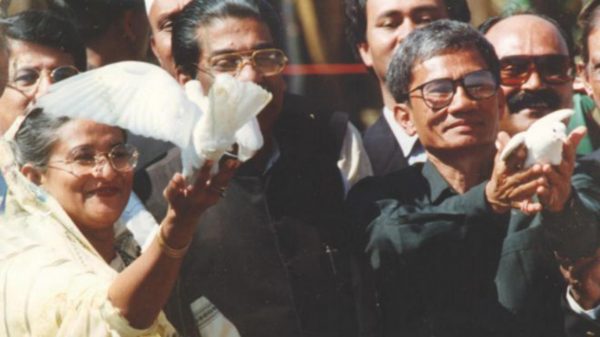22nd anniversary of CHT Peace Accord today

- Update Time : Monday, December 2, 2019
- 194 Time View

The 22nd anniversary of Chittagong Hill Tracts (CHT) Peace Accord is today.
The accord was signed on December 2 in 1997 between the government and the Parbatya Chattagram Jana Sanghati Samiti (PCJSS) during the first tenure of Prime Minister Sheikh Hasina, ending bloody conflicts in three hill districts.
The then Jatiya Sangsad Chief Whip Abul Hasnat Abdullah signed the agreement on behalf of the government while Jyotirindra Bodhipriyo Larma (Santu Larma) on behalf of PCJSS.
To mark the day, CHT Affairs Ministry led by minister Bir Bahadur Ushwe Sing paid homage to Father of Nation Bangabandhu Sheikh Mujibur Rahman by placing wreath at his portrait at Dhanmondi 32 in the morning today.
The ministry will later also hold a discussion meeting at its meeting room, said a media release.
A 3-day programme has been taken in Khagrachhari and the local administration has also taken adequate security measures for peaceful celebration of the day.
The programmes include peace accord fair, planting 22 saplings on Parbattya Zilla Council ground, colourful rally, placing wreaths at the portrait of Father of the Nation Bangabandhu Sheikh Mujibur Rahman at Town Hall.
A discussion meeting will be held at Khagrachhari Town Hall in the morning.
President M Abdul Hamid and Prime Minister Sheikh Hasina yesterday issued separate messages marking the completion of 22 years of the historic agreement.
In his message, President Hamid called upon all irrespective of party affiliations to work together to make use of the potentials of hill districts.
“I believe that peace accord is expediting socioeconomic and cultural development of the people in CHT region,” said the President.
He recalled that the historic CHT Peace Accord was signed between the CHT Affairs National Committee and the PCJSS on December 2, 1997 at the initiative of Prime Minister Sheikh Hasina, ending long-standing conflicts.
“It will remain as a glaring example for resolving disputes peacefully in the world,” the President said.
As a sequel to the implementation of CHT accord, the CHT Affairs Ministry and CHT Regional Council were formed, he said.
In her message, Prime Minister Sheikh Hasina greeted the countrymen, specially the people of the three hill districts, on the occasion of the completion of 22 years of the historic agreement.
The Prime Minister sought cooperation from all for full implementation of the CHT peace accord.
On December 2 in 1997, the historic CHT Peace Accord was signed without the mediation of any third party, with a view to stopping bloody conflicts in the CHT, she said.
“It’s a rare incident in the world history,” said the Premier.
This peace accord brought an end to the long-term bloody racial skirmishes in the CHT region and established the trend of peace and development there, she said.
Sheikh Hasina said achieving the UNESCO Peace Prize is a global recognition to this accord.
The Prime Minister said the post 1975 undemocratic governments (after the assassination of Bangabandhu) had created divisions between the Bangalee and the hill people for their self-interest instead of maintaining social stability there.
Killings, tortures and injustice, grabbing of lands and wealth and misuse of the state resources had made the region more unstable, she added.
In 2001, Sheikh Hasina said, the then BNP-Jamaat alliance government had opposed the historic peace agreement and wanted to destabilize the hilly region again. But their ill efforts went in vain, she added.
“We are pledge-bound to maintain peace across the country, including the CHT,” the Prime Minister said.
Sheikh Hasina said her government has been implementing massive development programmes in all sectors, including education, health, electricity, communications, infrastructure and mobile networks in the region.
Over 10, 890 families are given power supply by setting up solar panel in the region, she said, adding that a beautiful complex is being built on two acres of land in the Dhaka’s Bailey Road at a cost of Taka 194 crore for the people of hill districts, she added.
The Prime Minister said CHT is no more a backward locality because of the timely steps taken by the government.















